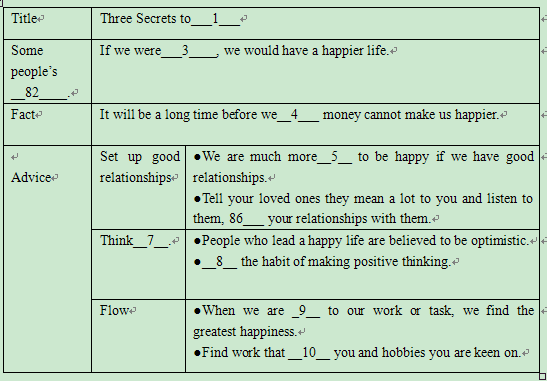题目内容
of about 100,000 separate genes made of DNA. These are the instructions for producing a person.
Genes decide everything from the colour of your skin to the way your brain works. You have one of
several billion combinations of DNA which come from the random mixing of your parents' genes. Except
for identical twins (同卵双胞胎), no one has the same combination as another person. You are unique!
You are unique in another way too: in the way you are raised and all the experiences you have from before birth to adult life.These experiences influence you, your behaviour and attitudes, and the choices you make.
But are genes or life experiences more important in shaping your appearance and personality? Scientists are studying twins to find out. One set of twins occurs every 70 births---some are identical and others are non-identical twins. Identical twins are special because they share exactly the same genes and often the same environment. Non-identical twins are more like ordinary brothers and sisters.
Some identical twins have been adopted and brought up in different homes. With identical genes but a
different home environment, scientists can study twins to see how much a particular feature depends on the genes we inherit. For example, we know that eye problems, like short-sightedness, are mostly genetic. But resistance to pain is largely dependent on experiences. Genes also influence our eating habits. Identical twins brought up apart often like to eat at the same time of day and feel full after eating the same amount.
Non-identical twins in similar circumstances have more varied eating habits. Identical twins are also more
likely to follow the same patterns for marriage and divorce than non-identical twins.
Scientists are trying to identify the different genes that influence our behaviour. Some people are
thrill-seekers and get into risk-taking and adventurous activities. They take up extreme sports like bungee
jumping and possibly take drugs. Scientists have discovered a gene which affects this.
We could ask, "Are our lives determined by our genes or our upbringing?" Scientists are learning more all the time, but it is certainly true that both are important in making us who we are.
B. How we turn out depends on our parents' genes.
C. Everyone has a physical double somewhere in the world.
D. Both our genes and our experiences make us who we are.
B. To discover what shapes us as individuals.
C. To compare differences between twins.
D. To study brother-and-sister relationships.
B. non-identical twins are usually not of the same sex
C. twins separated at birth behave exactly the same
D. identical twins are genetically the same
B. Eye-sight.
C. Pain resistance.
D. Marriage patterns.
B. Our attitude to risk-taking.
C. Our skill at bungee jumping.
D. Our ability to take drugs.

| |||||||||||||||||||||||||||||||||||||||||||||||||||||||||||

 e things before we realize that. So what will bring
e things before we realize that. So what will bring 